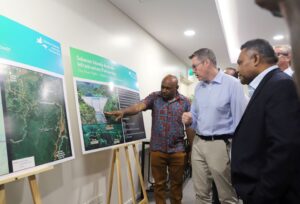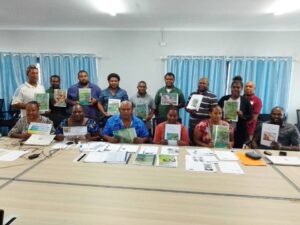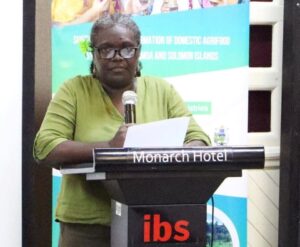BY JOHN HOUANIHAU
IT is the first time for the government’s agriculture ministry and the country to have an agriculture 10-year strategy plan, according to the Ministry of Agriculture and Livestock, Permanent Secretary, Mrs. Ethel Tebengi Frances.
In the wake of COVID-19, the Solomon Islands must have a road map that will consider a sector-wide approach towards agriculture development in the country.
Permanent Secretary of Ministry of Agriculture and Livestock (MAL), Mrs. Ethel Frances told the eight provincial leaders at this year’s Premiers Forum that the Forum has provided an opportunity where they can discuss potential areas for collective participation and opportunities to develop the sector (Agriculture).
‘’It started in 2019, where support comes from the national government to do provincial consultations. The Ministry was lucky to have support from two United Nations (UN) agencies – the Food and Agriculture Organisation (FAO) and International Food for Agriculture and Development (IFAD).
“The Ministry used its own local (national) consultants and they had gone down to do the consultation work on behalf of the Ministry regarding the strategic plan.
“The process has been very thorough. We did carry out our provincial consultations, brought in our officers and we look at it then we have a draft where we presented to Premiers where only a few Premiers did turn up.
“We also had expert advice from the two UN agencies. We also shared the draft with development partners especially those partnering with Solomon Islands like World Bank expertise in the areas of livestock,” Ethel told premiers.
“So, it is a strategy that is thoroughly consulted on and developed by an expert.
“What we did as a Ministry is we high local consultants, consult our technical teams with stakeholders, farmers and we send the input to FAO consultants that drafted the strategies together.
“So I want to acknowledge them for their support towards the development of this strategy,” she told the Premiers.
The 10-year Agriculture Sector Growth Strategy and Investment Plan (ASGSIP 2021-2030) once finalized and endorsed would become the first-ever Solomon Islands Agriculture roadmap that will guide the country in the development of the sector in the next ten years.
Mrs Ethel said the goal of the strategy is to sustain agriculture growth and investment plan, identify strategic opportunities and outline an ambitious pathway to revitalize, organize and commercialize the Agriculture sector to contribute to wellbeing.
“This is our plan and to be able to refresh the agriculture sector, it is our duty, not only the ministry, but us, to ensure that the aspiration in the strategy is achieved for this nation.
“The strategy has 4 programs that give the road map on how to revive the sector and has two parts, one about the program and the other is the detailed analysis from what it had captured through the provincial consultants.
“So the different target of the strategy is to increase the sector’s contribution to the GDP, increased self-sufficiency through the local food supply chain, decrease the level of stunting in children under 5 years, increased agriculture activity productivity and profitability for all value chain actors and decrease the level of people living below poverty.
“So those are the key goals that we want to achieve in the strategy.
“Over the years we have forgotten the agriculture sector. There has not been much attention and this strategy is very comprehensive.
“It covers a lot of areas because that is what if we want agriculture to grow that is what it needs to revitalize the agriculture sector,’’ Ethel said.
The Permanent Secretary also highlighted that the other two main programs under the strategy aim to achieve is livestock production for import substitutions and copra production for export earnings.
“If you look at the government priority now because of the COVID-19 go towards the last two programs on livestock production for import substitution and crop production for export earnings.
“Through the strategy, the Ministry also wants to set up agriculture advisory Services where they want to look at reviews and update the Ministry’s sub sector of commodity-specific policies,” she told the Premiers.
She added that one of the areas that has not been looked at very much is the establishment of policies that respond to the current challenge to strengthened teamwork with the private sector and farmer organizations to improve the delivery of equitable and inclusive extension Services.




